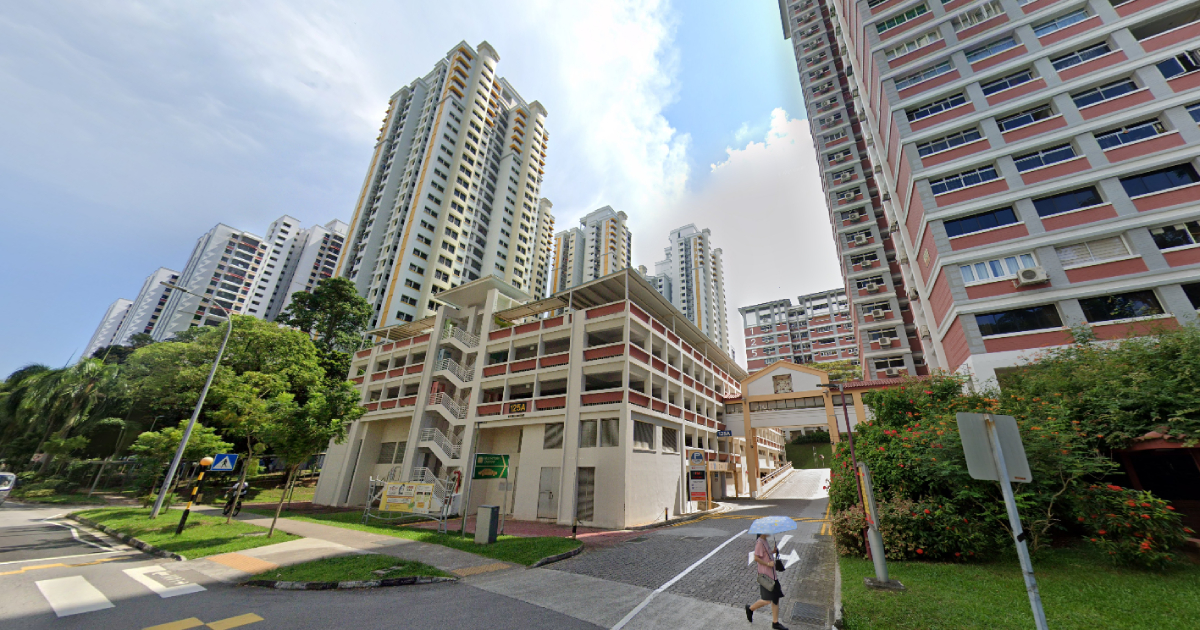2 male pangolins fight in S'pore in broad daylight, smaller one mortally wounded & euthanised
It is rare to see this shy nocturnal animal have a go at one of its kind.
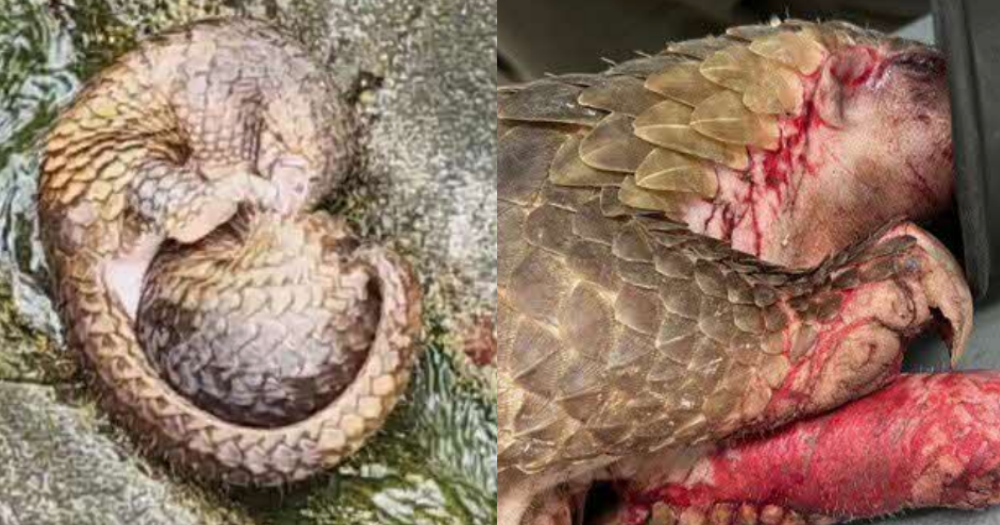
Two Sunda pangolins were seen fighting in a deep concrete drain in Singapore in broad daylight on Jul. 17, 2024, spokespersons for the National Parks Board (NParks) and Mandai Wildlife Group shared in a joint statement.
NParks staff were alerted to the rare sighting involving the shy nocturnal animal.
Both were identified as male pangolins, and one weighed 4.6kg, while the other was 8.7kg.
The smaller pangolin was observed to be in a defensive ball posture when found, with the larger pangolin latched onto it with its tail, while actively clawing at it with both front and rear claws.
Due to the dangerous environment they were in, both pangolins were removed by NParks.
During handling, the larger pangolin ceased clawing but remained firmly attached to the smaller pangolin.
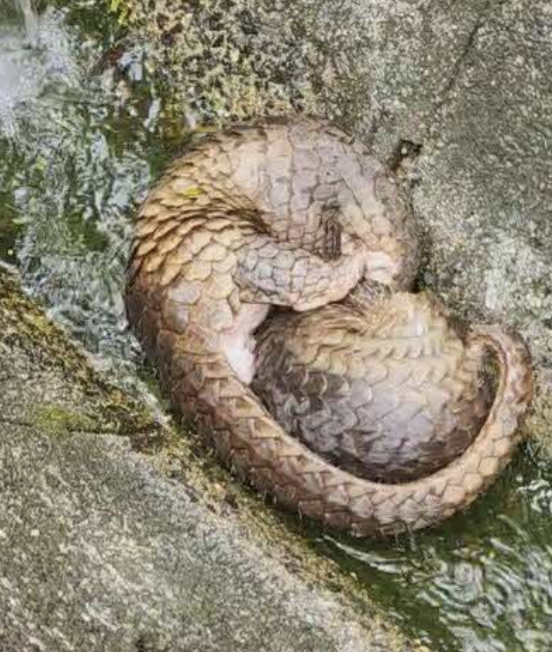 Photo from Mandai Wildlife Group.
Photo from Mandai Wildlife Group.
When the larger pangolin's tail was lifted, it released the smaller pangolin, allowing it to unfurl and swiftly move away.
NParks later rescued the two pangolins and brought them to Mandai Wildlife Group’s animal hospital for thorough examinations and treatments.
Smaller pangolin euthanised
The smaller pangolin sustained severe injuries, including excoriations, lacerations, abrasions and bruising around his face, neck, legs and abdominal area:
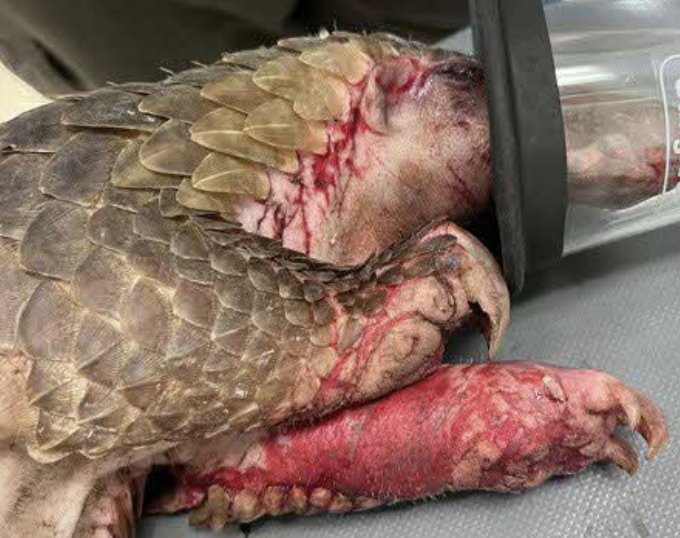 Photo from Mandai Wildlife Group.
Photo from Mandai Wildlife Group.
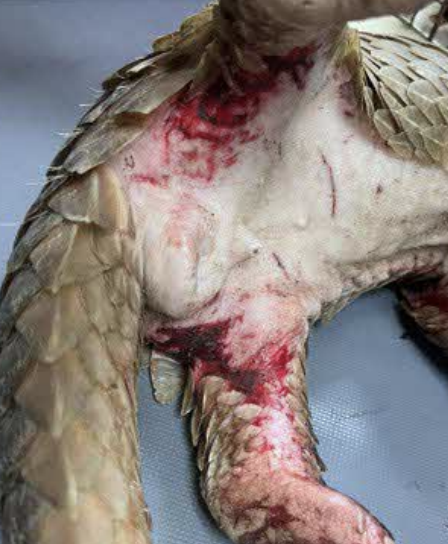 Photo from Mandai Wildlife Group.
Photo from Mandai Wildlife Group.
Despite immediate treatment, the smaller pangolin’s condition deteriorated, and it was eventually euthanised on veterinary and welfare grounds.
The larger pangolin, which had only minor wounds on its legs, responded well to treatment and was subsequently released into the wild by NParks.
Research value
Little is known about the reasons behind such conspecific aggression between male pangolins.
Conspecific aggression refers to aggression towards members of the same species.
To be clear, such incidents amongst male pangolins have been observed before, though they are rare.
The latest incident on Jul. 17, documented and published in Nature in Singapore by researchers at NParks and Mandai Wildlife Group, could nevertheless contribute to any future studies of Sunda pangolin behaviour.
The researchers noted that while the cause for the violence in the featured incident is not clear, it shows that pangolins are indeed capable of inflicting serious injuries on one another.
Pangolin conservation efforts
In 2018, a Sunda Pangolin National Conservation Strategy and Action Plan was developed by the Singapore Pangolin Working Group (SPWG), of which NParks and Mandai Wildlife Group are members.
The Sunda pangolin is a mammal native to Singapore.
This species is classified as critically endangered in the Singapore Red List 2023, as well as the IUCN (International Union for Conservation of Nature) Red List of Threatened Species.
Pangolins are also the world's most trafficked mammal.
The International Fund for Animal Welfare notes that their scales and claws are used in traditional medicine, and they are considered a delicacy in parts of Asia.
Pangolins tend to roll into a ball when threatened to protect themselves.
In fact, according to the World Wildlife Fund (WWF), the word "pangolin" comes from the Malay word "penggulung", which means "roller".
According to NParks, this tendency of pangolins to ball up makes it particularly easy for poachers and traffickers to pick them up and carry them away.
What to do if you see a pangolin
If members of the public spot a Sunda pangolin, they should observe it from a safe distance and not approach it.
They can also record their sightings via the SPWG website.
Such citizen science efforts are a great resource for conservationists.
The local community is also encouraged to help contribute to our knowledge about this elusive mammal, NParks and Mandai Wildlife Group shared.
Motorists are also urged to heed speed limits and drive safely when driving on roads near nature areas.
According to NParks, pangolins have suffered a great deal of habitat loss due to rapid urbanisation.
They sometimes stray too far off from forested areas onto our roads.
Since they are slow-moving, they are vulnerable to being killed or injured by vehicles.
In situations where the animal may require rescuing, members of the public may call NParks’ Animal Response Centre at 1800-476 1600.
The public can also contribute to the pangolin’s long-term survival by not purchasing any pangolin products, such as meat, scales, and medicinal products.
Photo from Mandai Wildlife Group.
MORE STORIES














